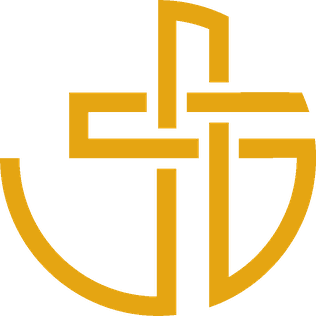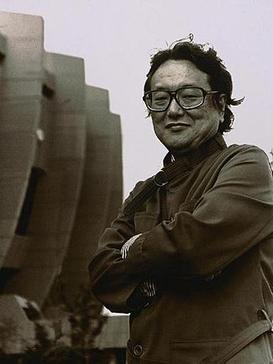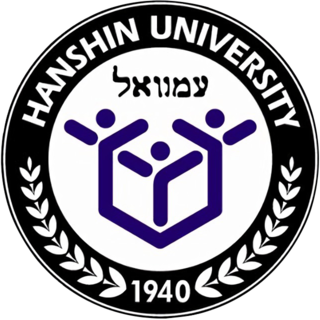Related Research Articles

Presbyterianism is a Reformed (Calvinist) Protestant tradition named for its form of church government by representative assemblies of elders. Though there are other Reformed churches that are structurally similar, the word Presbyterian is applied to churches that trace their roots to the Church of Scotland or to English Dissenter groups that formed during the English Civil War.

The Presbyterian Church in America (PCA) is the second-largest Presbyterian church body, behind the Presbyterian Church (USA), and the largest conservative Calvinist denomination in the United States. The PCA is Reformed in theology and presbyterian in government.

The practice of Christianity in Korea is marginal in North Korea, but significant in South Korea, where it revolves around Protestantism and Catholicism, accounting for 8.6 million and 5.8 million members, respectively. Christianity in the form of Catholicism was first introduced during the late Joseon Dynasty period by Confucian scholars who encountered it in China. In 1603, Yi Su-gwang, a Korean politician, returned from Beijing carrying several theological books written by Matteo Ricci, an Italian Jesuit missionary to China. He began disseminating the information in the books, introducing Christianity to Korea. In 1787, King Jeongjo of Joseon officially outlawed Catholicism as an "evil practice," declaring it heretical and strictly banned. Catholicism was reintroduced in 1785 by Yi Seung-hun and French and Chinese Catholic priests were soon invited by the Korean Christians.
The Presbyterian Church of Korea (PCK), also abbreviated as Yejang (Korean: 예장), is a Protestant denomination based in South Korea that follows Calvinist theology and the Westminster Confession of Faith. Since the 1950s, the denomination has separated into various branches of the same name due to theological and political disputes. As of 2019, 286 branches in South Korea, many of which have separated from the PCK, use the title 'Presbyterian Church of Korea'.

The hwan (Korean: 환) was the currency of South Korea between February 15, 1953, and June 9, 1962. It succeeded the first South Korean won and preceded the second South Korean won.

The World Communion of Reformed Churches (WCRC) is the largest association of Reformed (Calvinist) churches in the world. It has 230 member denominations in 108 countries, together claiming an estimated 80 million people, thus being the fourth-largest Christian communion in the world after the Catholic Church, Eastern Orthodox Church, and the Anglican Communion. This ecumenical Christian body was formed in June 2010 by the union of the World Alliance of Reformed Churches (WARC) and the Reformed Ecumenical Council (REC).

Park Tae-hwan is a South Korean competitive swimmer who is an Olympic gold medalist and world champion. He has four Olympic medals, five world titles, and 20 Asian Games medals. He won a gold medal in the 400-meter freestyle and a silver in the 200-meter freestyle events at the 2008 Summer Olympics. He also won two silver medals at the 2012 Summer Olympics in the 200- and 400-meter freestyle. He is the first Asian swimmer to claim a gold medal in the men's 400-meter freestyle, and the first-ever South Korean swimmer to win any Olympic medal in swimming. He also holds 3 Asian Records, all in Men's Freestyle. He is best known for his impressive range and versatility, as he is able to compete at international level in 100-, 200-, 400- and 1,500-meter freestyle.

Kim Swoo Geun was a prominent South Korean architect, educator, publisher and patron of artists. Along with architect Kim Chung-up (김중업), he is recognised as a significant contributor in the history of Korean architecture. With his support for diverse art genres of Korean culture, he was referred to as Lorenzo de Medici of Seoul by TIME in 1977.

Hanshin University (Korean: 한신대학교) is a private university in Osan, in the Seoul National Capital Area of South Korea. Established in 1939, it is affiliated with the Presbyterian Church in the Republic of Korea. Hanshin University was formerly a theological seminary and became a university in 1980. It currently offers undergraduate and post-graduate degree programs as well as modules for continuing education.
The Presbyterian Church in the Republic of Korea or the KiJang Presbyterian Church is an ecumenically-minded Presbyterian denomination in South Korea.

The Presbyterian Church of Korea, also known as Yejang Tonghap (Korean: 예장통합) or just Tonghap, is a mainline Protestant denomination based in South Korea; it currently has the second largest membership of any Presbyterian denomination in the world. It is affiliated with its daughter denomination, the Korean Presbyterian Church in America (KPCA) of the United States, which adopted the "Korean Presbyterian Church Abroad" as its new name in 2009.
The Presbyterian Church in Korea (JungAng) was formed when Pastor Baek Kee-Hwan left the HapDongJungAng. In 2004, it has 60,500 members and 355 congregations. It subscribes the Apostles Creed and Westminster Confession.
The Presbyterian Church in Korea (JangShin) is a Reformed denomination in South Korea, started in 1977 a group of ministers who graduated from the HwanWon Seminary under the leadership of Robert s. Rapp. JangShin integrated other denominations and grew in numbers. In 2004 it had 19,000 members and 209 congregations in 9 Presbyteries and a General Assembly. JangShin affirms the Apostles Creed and Westminster Confession.

According to a 2021 Gallup Korea poll, 17% of South Koreans identify as Protestant; this is about 8.5 million people. About two-thirds of these are Presbyterians. Presbyterians in South Korea worship in over 100 different Presbyterian denominational churches who trace their history back to the United Presbyterian Assembly.
The Presbyterian Church in Korea (HapDongHwanWon) is a result of the unification of 3 groups in 1983. HwanWon church united with the independent JungAng Presbytery and the JeongTong church. It subscribes the Apostles Creed and the Westminster Confession. In 2004 it had almost 10,000 members in 46 congregations served by 46 pastors.
The HoHun church separated from the Presbyterian Church in Korea (HapDong). In 1961 25 delegates to the Assembly among the Pastor Kim Yun-Chan and Pastor Kim Yun-Chan formed a special association for the safeguard of the conservative Reformed faith. The following year they formed HoHun. Conflict in leadership arose in the early 1960s. A group led by Pastor Lee Do-Bong sought to prolong Park Byung-Hun in the leadership. A new moderator Rev. Song Jae-Muk separated and formed the Presbyterian Church in Korea HwanWon. A clash occurred in the denomination. Later the church had overcome successfully of the financial difficulties. Rev. Sin Eun-Kyun was elected as moderator. A year later Park Byung-Hun and his followers separated, after Park's death most of his former followers returned to HoHun. In 1982 the church established the Committee for Combining Denominations. Several small denominations joined HoHun as a result. In 2004 it had 120,000 members and 910 congregations in 39 Presbyteries and a General Assembly. The Church adheres to the Apostles Creed and Westminster Confession.
The Korean Methodist Church is a large Methodist denomination in South Korea and the rest of the world, with approximately 1.5 million members. Methodist missionaries came from the United States in the late 19th century. It became independent in 1930, and celebrated its centennial in 1984. The denomination has ties with its mother church, the United Methodist Church.
The Kosin Presbyterian Church in Korea, also called Korea-pa, is an Evangelical Reformed and Presbyterian denomination in the Republic of South Korea. Although, congregations have spread all over North America and in many other countries.